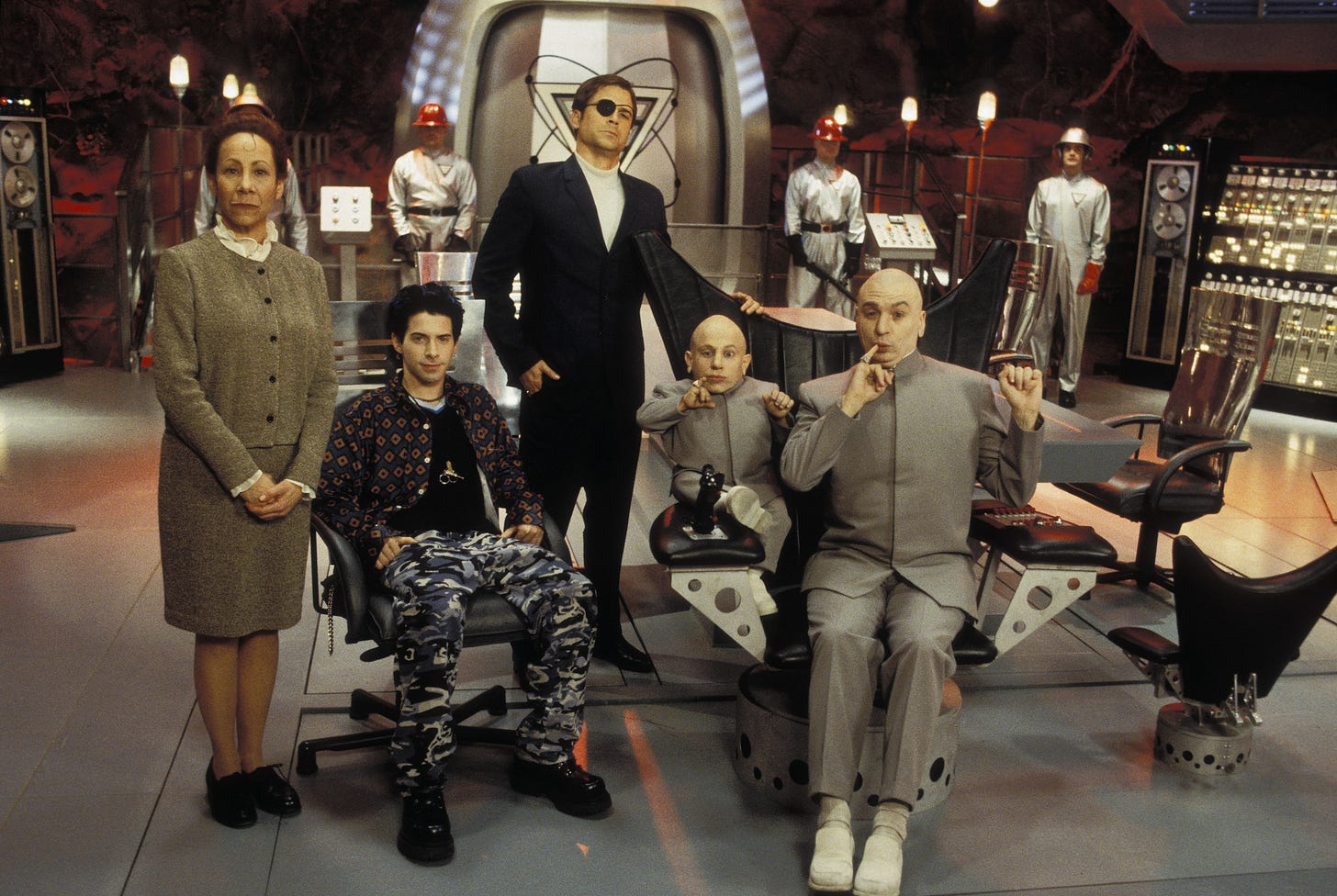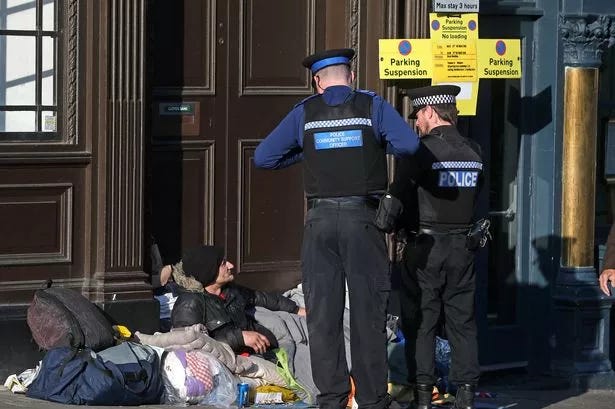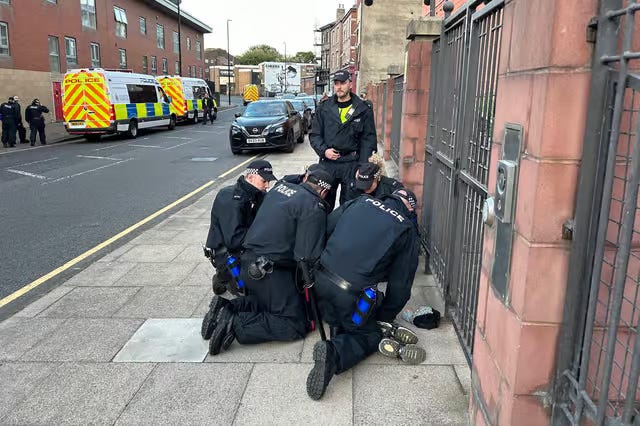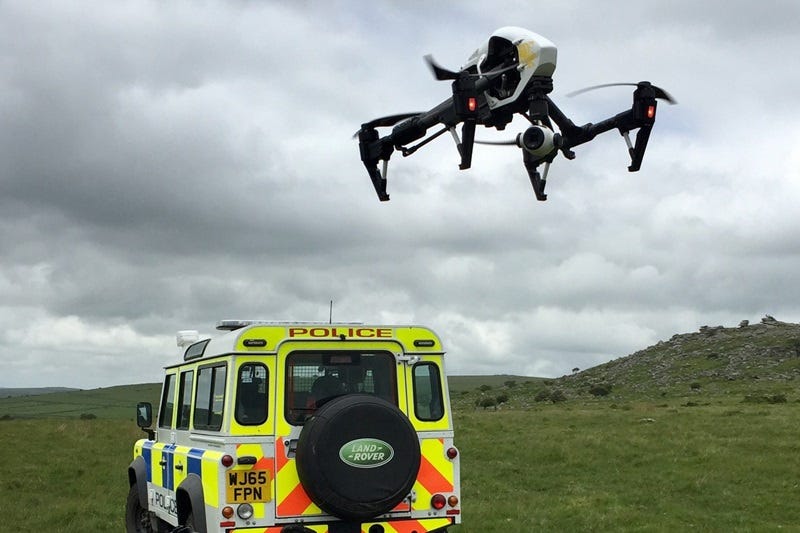The officers of Dorset (Free Force) Police, inspired by this.
I was surprised, after the snap election, when the new Home Secretary knocked on my door. ‘I’m calling your bluff, Adler,’ she said. ‘I want you to run one of these Free Forces you’ve been banging on about.’
‘I’m retired,’ I said, gazing manfully - but with a hint of vulnerability - into the middle distance. Emotional music swelled in the background, along with a flashback to my breakdown (after a distance learning module on Dignity in the Workplace). ‘I’m burned-out, Home Secretary. An ex-cop on the edge.’
The Home Secretary gripped my shoulder. ‘Britain needs you, Dom. One last job. Besides, you can have posh biscuits at your HQ. M&S ones.’
‘No! Not just HQ,’ I said. ‘Posh biscuits for everyone, even the traffic officers.’
‘Done! The Home Secretary declared. ‘Is there anything else you need?’
‘Immediately close the College of Policing and turn it into a roller disco. Or a bubble tea shop. Something more relevant to law enforcement.’
‘Consider it done,’ the Home Secretary replied.
I put my hands on my hips, not unlike Lord Flashheart. ‘Woof!’ I declared. ‘I’m in.’
It’s been two years since we established Dorset Free Force. I demanded Dorset as revenge for Lorne Castle (who I reinstated, after sacking the entire Senior Management Team). It hasn’t been easy. The Blob’s tried to thwart us at every turn, but I was expecting that. It helps that I’m not really the chief constable. I’m not even a police officer. I’m a super-empowered quangocrat, except one who knows what he’s doing. The real Chief’s a gnarly ex-superintendent from another force, who I promoted the day after interviewing him (over a three-bottle lunch). He’s a bit rough around the edges, to be honest, but criminals detest him with a fiery passion (so does The Guardian). Which means local taxpayers love him. I simply provide top cover.
Anyhow, after rocking up at headquarters, my first two actions were;
Calling the Chief into my office (which is lavishly appointed, with a globe-shaped drinks cabinet), I said, ‘while I’m making a cunning plan, get out there and police like it’s 1995. I’ve got your back.’
To spend an eyewatering amount of money on a crack team of lawyers, consultants, ex-political communications lizards, systems geeks, wonks, wily retired detectives of the old-skool and other creatures of the night. I call their office ‘The Skunkworks.’
You were probably anticipating my first decision. But the second? I suspect you might be genuinely fucking surprised / horrified / baffled (etc).
Good. Let me explain.
My Skunkworks team, disassembling the Human Rights Act, stated-case-by-stated-case.
If there’s one thing I’ve learned about British politics since 1997, it’s this; politicians don’t control anything. The system does - i.e. the civil service and a baroque web of quangos. They allow politicians to cosplay as decision-makers. This was entirely intentional - the Blairites baked leftist technocracy into every corner of the administrative state. Think of it as ideological handcuffs, designed to restrain governments for all time (now imagine Tony Blair ‘bwahahahahah’ laughing, like a cartoon villain). I know. it’s technical and boring. Nonetheless, it’s the main reason why changing anything is virtually impossible. It’s like trench warfare, but with Excel and PowerPoint. Even with a newly-elected, pro-policing government.
Which is where the Skunkworks comes in.
Every new idea upsets a shiny-arsed creature in the Cabinet Office or the Home Office or the National Association of Nitpicking Fuckwits (I’m sure that exists). Which means, before it’s even announced, our policies are run through the Skunkworks. We also prime lawyers, influencers, opinion-formers, policy experts and friendly politicians accordingly. We’ve written preemptive skeleton arguments for the courts, anticipating legal proceedings. We’ve lodged challenges to poorly-drafted primary legislation. Judicial reviews? Absolutely. In essence, we’ve created a full-spectrum shield wall for our officers to work under. I also have a team of reality-based practitioners (the ex-coppers I go on the piss with every other week) to QA the blue-sky thinking.
I know it sounds dry, but you should see the Skunkworks in action. It’s like Bletchley Park in there, oddballs merrily throwing spanners into works. Or a moody backstreet defence solicitor’s office, the kind who always get their clients off. Why? To make Dorset safe for residents and an utter fucking nightmare for criminals. It’s sad we need the Skunkworks, to be honest, but we are where we are. I was a policeman, and live in the world as it is. Not as I’d like it to be. It’s strange how the bloke in charge of policing needs a team of subversives to perpetually challenge the law… to protect the public. Welcome to 2025. Anyway, only my Free Force has a Skunkworks. Others? They have compliance units and lawyers, all worshiping at the altar of Home Office silliness. Tying themselves up in red tape, like happy gimps.
Now, that’s the science bit. What, exactly, are these heretical practices the Skunkworks protects?
Policing, Yes. Social Work, no.
Police in Bristol, speaking with rough sleepers.
The police no longer know what they’re meant to be doing. Which is, er, Policing. I decided Dorset Free Force would do much, much less - but do it better. So, naturally, local authorities went apeshit when they realised we’d no longer provide officers for non-police duties. I patiently explained how, from now on, we would only focus on policing - by which I mean maintaining the Kings Peace, protecting life and property and, of course, catching criminals. Would we abide by our safeguarding obligations? Yes. Would we be maximalist about it? No. Oh, and we’d be calling out social workers dropping intractable problems on our laps because its 4pm, or because they’re working from home. Along with the bill for our time.
The County Council issued legal letters, which of course the Skunkworks war-gamed in advance. We sent a load back. There’s litigation ongoing, especially around our council tax precept, but on the other hand the crime rate’s going down and public satisfaction is up. The local MP is onboard with the Free Force project too, which helps. She says it doesn’t harm her already healthy majority.
Oh, and we absolutely do not - under any circumstances - trouble ourselves with hearts-on-our-sleeves lanyard-wearing, performing the macarena at Pride, social media spats, NCHIs, point-scoring, or online bullshit. Unless there’s clearly a risk involved, we suggest people grow up instead (more litigation, blah blah blah). Do I get sneaky phone calls from chief constables asking me how I get away with it? What do you think?
Robust Policing
There’s a suspect under there.
Dorset Free Force operates a policy of robust policing. Which is police-speak for our officers take no shit, especially from fifteen-year-old ratboys carrying knives. Our force philosophy is simple - everyone has the right to enjoy the streets free from crime and antisocial behaviour. To achieve this, on occasion, our officers use physical force. They might even (clutch those pearls!) use the occasional hurty word to reinforce a point, achieve psychological dominance or simply because it’s one of those days. Our officers wear body-worn video. They are accountable under law. Having said that, policing is a shitty job. Everyone has a bad shift. That’s reflected in the way our professional standards department makes decisions, something I’m especially interested in.
Which means Dorset Free Force officers are supported, to the hilt, by me, the PCC, the Chief Constable, every sworn officer, member of civil staff and the cooks in the newly-installed canteens. And if officers don’t act in good faith, we sack them. It really isn’t difficult. It probably helps that we run a protected online forum for community representatives (not activists), where they can view video footage of contested incidents - we take their views into account moving forward. And, to be honest? They like what they see. If anything, I think they’d like us to be more robust.
We also targeted the force area’s top fifty criminals by, I’m relaxed to admit, proactively policing them until they either (1) stopped committing offences and / or engaged with social services in a meaningful way, (2) moved out of the force area or (3) were in prison. We were accused of harassment. Boo-hoo. This isn’t a popularity competition.
The Skunkworks, working with the force legal team, has prepared defence strategies for officers unfairly targeted by the Independent Office of Police Conduct. On the other hand, we have a reasonable, constructive relationship with the IOPC; since we overhauled our recruitment and training, we get less complaints.
Did I mention there’s a waiting list to join our Force?
Leadership and Organisation
Dorset Free Force operates a logical, geographically consistent force structure. There’s no point reinventing the wheel, besides I knew bugger-all about the county when I arrived (except for forays to Bovington). I decided to let local officers (of all ranks) tell me what they thought. Then, I listened to them. Shocker, eh?
Each divisional commander enjoys considerable autonomy. Local operations, initiatives, squads, task forces? Crack on. We’re big fans of Auftragstaktik. Our hybrid working policies give commanders lots of flexibility deploying officers, too.
We also ditched the Home Office Counting Rules, as part of the Free Force trials agreed with the Home Office. To speed up charging decisions, we’ve reinstated divisional teams with the local CPS, which we’re part-funding (it’s amazing the money you save when you cut bureaucracy). We’ve shredded time-wasting nonsense by letting officers ‘screen out’ crimes - after investigation - without solely relying on call centres or online reporting mechanisms. We’ve found the public understand why police might not be able to solve crimes if officers actually turn up and have a look in the first place.
Every day, the Chief speaks to local leaders for feedback. If there’s a problem, and he’s unable to offer a command solution, he refers it to the Skunkworks (which operates 24/7). Their job is to suggest ‘lawfully audacious’ options. He is, of course, free to turn them down - he’s the boss.
Flexible Employment
The Police Federation also went apeshit after I demanded control over Free Force recruitment, training and conditions of service. I think, slowly, I’m winning them over. I know our officers prefer the way we do things - we have the UK’s best retention rate, after all.
What did we do?
First of all, we reshaped our employment offer as a force. We only want people who want to police; it’s a vocation, not ‘just a job.’ We’re a family - that means looking after our officers, in word and deed - while ruthlessly shedding the genuine floggers and wrong ‘uns who let us down. We also run high-quality residential training with strict pass / fail standards. We use novel pay and pensions structures. We offer subsidized accommodation for younger officers. We absolutely don’t believe in ‘churn’ - we keep good people for as long as we can.
For example;
We don’t have special constables. We have a police reserve. Officers choosing to go part-time can transfer between the two without suffering penalties to pensions or pay, which are adjusted accordingly. This includes specialists. People who join as reservists can be considered for regular service under a modular development program.
The Force career development strategy encourages officers to develop a portfolio of skills. We try to avoid specialists empire-building, or locking local officers out of delivering roles like intelligence, surveillance, fraud, online investigation and public order.
We’re exempted from national police promotion systems. We promote on merit only, running fair, open, residential selection processes. There’s no weighting for candidates based on ‘protected characteristics.’
Nobody in Dorset free force is eligible for promotion until they’ve served for five years as a constable. This isn’t prescriptive - candidates transferring from other blue light services or the military, for example, are able to have this period adjusted downwards. We’re trialing high-potential schemes for exceptional candidates - after they’ve done five years. All of our leaders have worked at the coalface for a meaningful period of time.
We’re imaginative - we happily employ sworn and non-sworn personnel on temporary contracts, across a variety of roles, if it meets our operational requirements. Indeed, we encourage officers leaving the service to pursue other, possibly synergistic roles, to stay in touch. For example, we recently rehired six retired detectives (overnight) on three-month contracts to augment our major inquiry team.
Technology
‘You have ten seconds to comply…’
This one’s always going to be a work in progress - technology moves too quickly for it to be otherwise. As we evolved the Skunkworks, we ended up with a technology team to identify and implement long and short-term solutions for policing problems. Stuff we’ve done includes;
The Force Drone Coordination Team - utilizing private contractors, we’ve developed a small highly capable fleet of UAVs to support operations. We’re trialing a force drone unit, but value for money is our priority.
Command and Control technology - no, we didn’t buy a new system. We simply copied the best-performing force and poached their IT and managers. Our response times are improving, because our officers do less stuff, but better. We’ve also nearly halved bureaucracy, but we need to do more.
AI - I know it’s trendy, but we’re trialing AI to work across our force systems. It’s saving our incident rooms and intelligence units a bloody fortune. Our performance around crimes in action, MISPERS and complex investigations is improving as a result.
I could go on. I really could. But I hope you get the picture. Now, I realise some people reading this might think, ‘but isn’t this how the police is run anyway? It all seems quite straightforward.’ And that’s the problem, because they’d be correct.
But the police doesn’t work like this. Quite the opposite, in fact.
Now, I’m hardly the cleverest bloke in the room. I retired as a constable. So I’m sure others have worked this stuff out too. Yet here we are. Which means, I’m afraid, I have to point the finger of blame not only at our political class, but our police ‘leaders.’ Until a chief constable has the cojones to say ‘we can’t police anymore, so fuck this,’ at a select committee or a press conference - and what a mic drop that would be - then policing will continue to fail. And fail badly.
Of course, the chiefs won’t. They want their KPMs and their OBEs too badly. The status and the salaries. I’ve never been an ambitious man, so I genuinely don’t understand the mindset. I’ve met them, though. Looked into their dead, glassy eyes. Listened to their droning voices. The boilerplate, social-justice-by-way-of- LinkedIn babble they speak.
Which is why the system needs changing, badly. The question is, will we?







Where do I sign back up please?
I truly believe that many in this wonderful country of ours would want to live in Dorset if they only knew how it was being policed.
I hope you also ban those so called 'auditors' or at least declare Dorset's airspace a no drone zone.
Keep up the good work.
Excellent Dom, almost radical - without being political. I note Bill Bratton gets a look-in when you write: ' decided to let local officers (of all ranks) tell me what they thought. Then, I listened to them'. Exactly what he did when at NY Transit Police when swoops ran out of custody places, so he got a bus converted to handle the vast majority of offenders with instant charge & bail.
I fear a certain CC might steal your ideas after listening to his talk last week. See: https://www.youtube.com/watch?v=3erM3L4hE5g A policing friend "boiled it down" to: Scrap NCHIs,
Investigate everything (if there is a reasonable line of enquiry) and Be better at NHP.
When will you write a similar comment on the College?